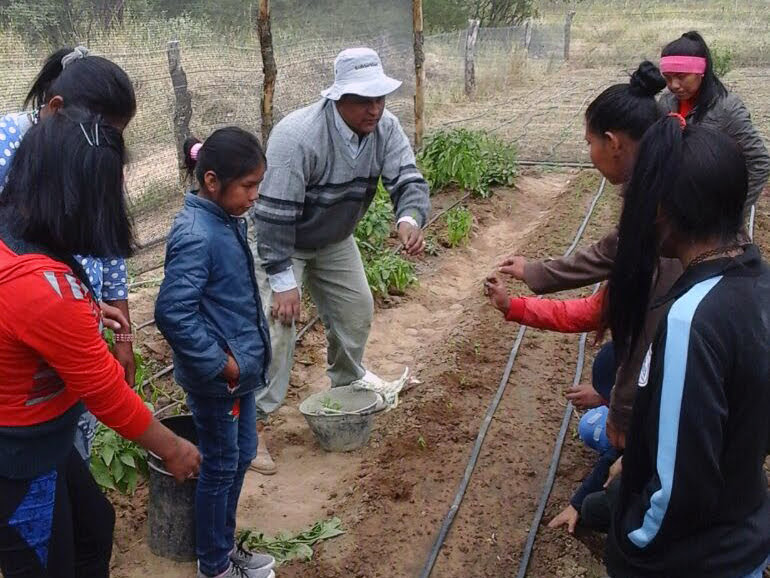Capturing water in the thick of the forest
It’s morning and from inside the thick dry forests, silently and unperceived, one after the other, the women from nearby indigenous communities arrive to a cutwater edge with buckets and fishing poles. One of them is Cecilia Ricardi, from the village of Karandá. She says:
Now that it is dry again, we go far away to fetch the water. It does not rain and we come to the cutwater to find fish to feed our children.
The old cutwater from which the water is currently extracted is almost exhausted, so during the dry season the water gets dirty with mud. Cecilia explains:
When we get home, we treat the water so that the children do not drink mudwater. Water sometimes produces diseases such as diarrhea, vomiting and in extreme cases the death of some children so we have to work to prevent this.
Through the Mismo Indigenous Organization, the community of El Estribo presented a project in 2017 to install a new cutwater. This was presented to governance initiated by Solidaridad, the municipality of First Lieutenant Irala Fernández, the Paraguayan Institute of Agrarian Technology and the Government of President Hayes.
Cecilia catching fish in the river
After two years of joint work, 17 indigenous villages finally have two new water reservoirs with the capacity to capture 36 million liters of rainwater. These are located in sites with good availability of clay in the soil which means both reservoirs run little risk of leaks and will provide water to 944 families to cope with prolonged droughts. Cecilia says:
We use the water that we carry from the cutwater to do many things such as wash clothes, cook, and drink. When there is no water, it affects everyone, and we start digging wells to look for water. Now that we have new cutwater, we are very happy. We are waiting for the rain to come so that the new reservoir can be loaded.
The old cutwater
The new cutwater
Ensuring food security through argicultural support
Since 2016, Solidaridad has carried out the ‘‘Sustainable Chaco" project with funding from the Government of the Netherlands. The project has since implemented a model of agricultural development with indigenous communities to ensure food security and, at the same time, provide a source of income for the community during the dry season which can last for up to seven months.
In addition to improving the capture of rainwater, the project has installed eight school gardens and a range of community gardens that serve a total of 390 families. All orchards have drip irrigation systems to avoid excessive use of water and provide fresh organic vegetables to feed school children. The income earned from the cash crops is used to maintain and expand social pharmacies.
Carmen is a school teacher and teaches 21 young children, from preschool age up to the sixth grade, at Santa Isabel School. She serves the oldest children in the morning and the youngest in the afternoon. In 2017, an orchard was installed in the backyard that both Carmen and the children help to maintain during school hours. She explains:
The project started from the need to obtain vegetables, which many children do not have at home. Many times, when the children don’t have anything to eat at home, we make a pot here, and use the vegetables for a stew.
The school children
Since this initiative, Carmen explains that the dropout rate has decreased. While the garden has a manager, all collaborate to maintain it.
All of children are thrilled. The tomatoes are just about to ripen and they’re ask me every day to go to the orchard. They also like onions a lot.

Children being taught to grow vegetables
Through a ‘learning by doing’ model, the children are learning how to carry out the orchard, and Carmen reinforces the practice with nutrition topics in class. Taking the learning home, Carmen is urging families to also grow their own gardens at home. "Here the soil is very good, but with a little fertilizer everything is possible," she said.
It just takes a bit of training for parents to also become aware of its benefits, and in this way everyone benefits.
